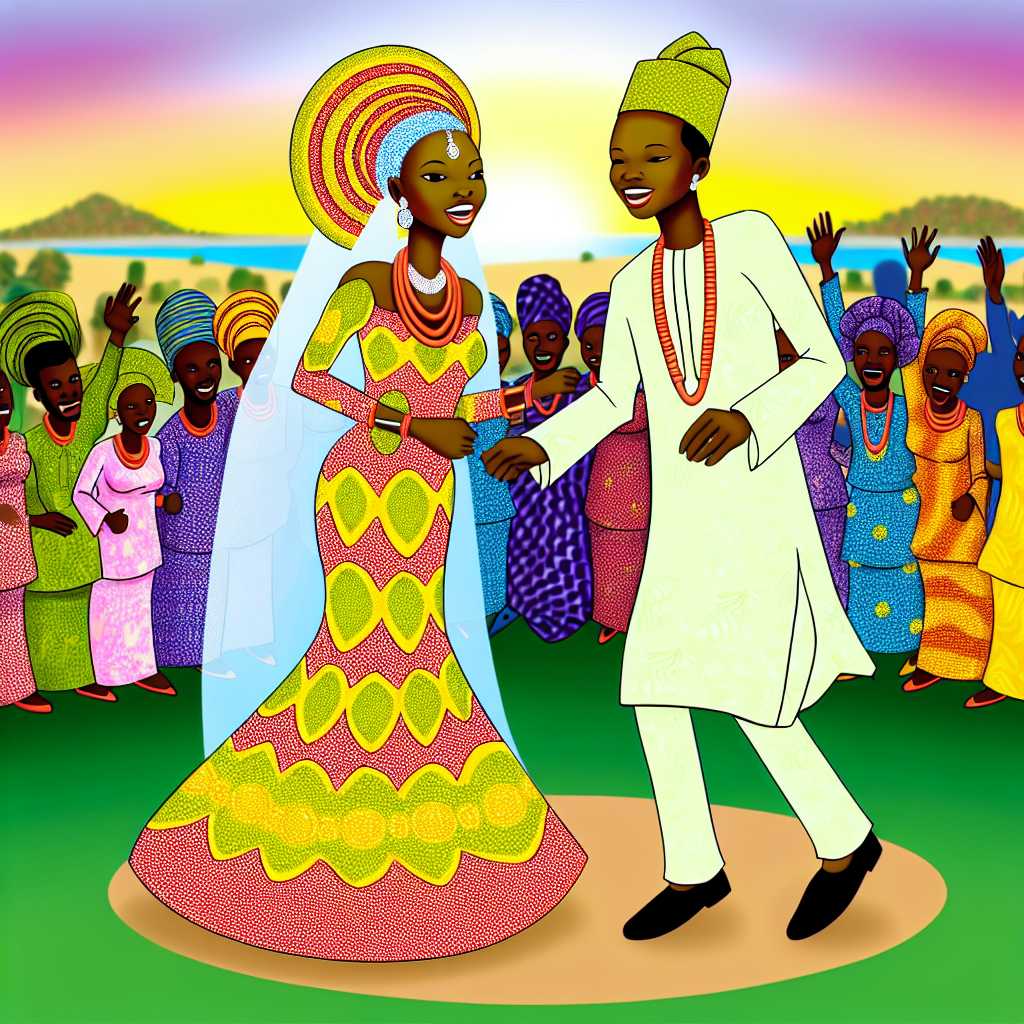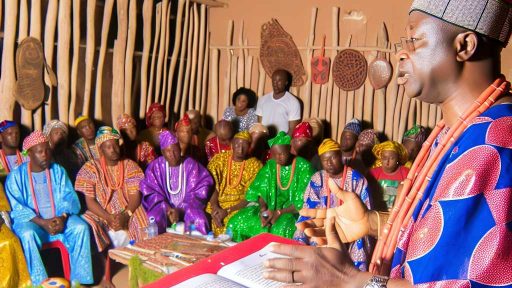Historical Perspective on Marriage in Nigerian Society
Traditional Marriage Practices
Marriage in traditional Nigerian society serves as a cornerstone of community life.
It often involves elaborate rituals that can last several days.
Furthermore, these rituals symbolize the merging of two families.
Customs vary significantly across Nigeria’s diverse ethnic groups.
For instance, the Yoruba emphasize the significance of family approvals.
In contrast, the Ibo focus on the bride price negotiations.
These practices illustrate deep-rooted cultural values surrounding marriage.
Colonial Influences on Marriage
The colonial era introduced Western marriage practices to Nigerian society.
Christian missionaries played a significant role in this transformation.
They promoted monogamy as the ideal marital structure.
This shift often conflicted with traditional polygamous customs.
Consequently, many Nigerians found themselves navigating two systems.
This duality continues to influence marital choices today.
Post-Independence Changes in Marital Norms
After Nigeria’s independence, various reforms impacted marriage practices.
The 1970s Family Law reforms addressed issues like inheritance and divorce.
Such changes aimed to promote gender equality in marital relationships.
Additionally, societal attitudes towards marriage began to evolve.
Younger generations now value love and compatibility over arranged unions.
These shifts reflect broader global trends in marital expectations.
Marriage as a Symbol of Unity
Today, marriage represents a vital symbol of unity in Nigerian society.
It transcends individual couples, linking families and communities.
This bond fosters social cohesion and communal support.
Moreover, marriage ceremonies often serve as major social events.
They bring together diverse groups, strengthening communal ties.
Marriage in Nigeria embodies cultural heritage and collective identity.
Cultural Significance of Marriage as a Unifying Factor in Nigeria
Bridging Ethnic Divides
Marriage in Nigeria serves as a bridge across various ethnic groups.
Through inter-ethnic marriages, families unite and deepen bonds.
This collaboration enhances cultural exchange and mutual understanding.
Strengthening Family Ties
Marriage solidifies family connections in Nigerian culture.
It creates networks of support among families and communities.
These relationships foster social cohesion and collaboration.
Celebrating Traditions
Nigerian weddings showcase rich cultural traditions and rituals.
Each culture’s unique celebrations contribute to the nation’s diversity.
This diversity enriches the cultural fabric of Nigerian society.
Community Involvement
Marriage ceremonies often involve entire communities.
Such participation fosters a sense of belonging and unity.
Communal celebrations strengthen relationships among individuals.
Promoting Values
Marriage symbolizes commitment, loyalty, and partnership.
These values resonate deeply within Nigerian culture.
They serve as fundamental principles guiding interpersonal relationships.
Marriage Rituals and Traditions Across Different Nigerian Ethnic Groups
Overview of Nigerian Ethnic Diversity
Nigeria is home to over 250 ethnic groups.
Each group has its distinct culture and traditions.
Consequently, marriage customs vary widely among them.
Yoruba Marriage Traditions
The Yoruba people celebrate marriages through elaborate ceremonies.
These rituals often include a traditional engagement called “iwa-alejo.”
During this ceremony, family members exchange gifts and prayers.
Furthermore, the wedding feast features traditional Yoruba dishes.
Guests often wear colorful attire, showcasing rich cultural heritage.
Igbo Marriage Customs
In Igbo culture, marriage signifies unity and community bonding.
The traditional process begins with “ukwukwe,” or bride price negotiation.
This step signifies the groom’s commitment to the bride’s family.
Moreover, the wedding features traditional dance and music.
Igbo brides often wear unique outfits with decorative beads.
Hausa Wedding Practices
The Hausa community values elaborate wedding celebrations.
Typically, weddings last for several days, filled with festivities.
Traditional customs include the “kayan zama,” which involves bridal gifts.
Additionally, Hausa weddings showcase traditional poetry and music.
The use of colorful textiles adds vibrancy to the occasion.
Efik and Ibibio Marriage Customs
Efik and Ibibio cultures highlight the importance of family support.
Marriages often involve the intense “introductions” ceremony.
During this event, families formally meet and exchange pleasantries.
The wedding feast features local dishes like “edikan ikong” and “nsala soup.”
Guests participate in joyful traditional dances throughout the event.
Cultural Significance of Marriage Rituals
Each ethnic group’s marriage rituals embody distinct cultural values.
The diversity in these traditions illustrates Nigeria’s rich cultural tapestry.
Marriage remains a vital institution fostering unity and continuity.
Delve into the Subject: Marriage as a Rite of Passage in Nigerian Communities
The Role of Family and Community in Marriage Ceremonies
The Importance of Family in Marriage
Family plays a crucial role in Nigerian marriage traditions.
It provides emotional support during the wedding preparations.
Additionally, families often collaborate on various wedding arrangements.
This collaboration fosters unity between the two families.
Moreover, the family’s approval often signifies readiness for marriage.
The Role of Community in Celebrating Marriages
Community involvement enhances the significance of wedding ceremonies.
Local customs and traditions shape how weddings are celebrated.
Communities often come together to support the couple’s union.
This support can involve organizing events and celebrations.
In many instances, entire neighborhoods participate in the festivities.
The Symbolism of Collective Celebration
Weddings are seen as collective celebrations in Nigerian culture.
They symbolize unity not just for the couple, but for both families.
This unity reflects shared values and traditions.
Furthermore, it strengthens community bonds and support networks.
Ultimately, marital unions reaffirm communal ties and cultural identity.
Bridging Generational Gaps
Marriage ceremonies often bridge generational divides.
Older generations pass down traditions during these celebrations.
Younger family members learn about cultural heritage through participation.
This learning process fosters respect for family history.
Consequently, it strengthens familial and societal connections.
Gain More Insights: The Changing Face of Marriage in Nigeria: Trends and Insights
Marriage as a Means of Social Cohesion and Conflict Resolution in Nigeria
Promoting Social Cohesion
Marriage serves as a vital tool for social cohesion in Nigeria.
It unites families and communities, fostering collective identities.
Additionally, marriage strengthens social ties among different ethnic groups.
This unity promotes collaboration and shared cultural practices.
For instance, marriages often bridge gaps between different tribes.
Such connections enhance understanding and respect among diverse cultures.
Conflict Resolution Mechanism
Marriages play a crucial role in conflict resolution within Nigerian society.
They create alliances that help mitigate disputes between families.
These alliances often include formal agreements during marriage negotiations.
Consequently, they encourage parties to resolve their grievances amicably.
The involvement of elders and community leaders facilitates this process.
Cultural Significance of Marriage
Culturally, marriage symbolizes unity and continuity in family lineage.
It is a significant lifecycle event celebrated with vibrant traditions.
The rituals associated with marriage amplify its importance in society.
Moreover, ceremonies often involve communal participation, enhancing bonds.
This shared experience reinforces communal values and responsibilities.
Social Benefits of Marriage
Marriage provides various social benefits that contribute to stability.
- It offers emotional support and companionship for individuals.
- These partnerships foster economic cooperation between families.
- Children born within these unions inherit social and cultural legacies.
Marriage in Nigeria is more than a personal commitment.
It is a significant social institution that promotes unity and harmony.
As a result, it actively contributes to a more cohesive society.
Gain More Insights: How Nigerian Marriages Have Evolved: Traditions to Modern Day

Legal and Religious Frameworks Governing Marriage in Nigeria
Overview of Marriage Laws
Marriage in Nigeria encompasses various legal systems and traditions.
The country recognizes statutory, customary, and Islamic laws regarding marriages.
Each legal framework plays a significant role in shaping marital practices.
Statutory Marriage
Statutory marriages occur under the Marriage Act of 1970.
This framework mandates registration with government authorities.
These marriages often involve civil ceremonies officiated by registered ministers.
Moreover, couples must meet specific legal requirements before marrying.
Customary Marriage
Customary marriages reflect local traditions and practices.
They are recognized under Nigerian law and differ by ethnic group.
Typically, these marriages involve traditional rites and ceremonies.
Additionally, customary unions often require the consent of both families.
Islamic Marriage
Islamic marriages follow Sharia law, aligning with the religious beliefs of Muslims.
These marriages typically require a contract or “nikah” to be binding.
Furthermore, they emphasize the importance of consent from both parties.
Religious Influences on Marriage Practices
Religious institutions profoundly influence marriage customs in Nigeria.
Christianity and Islam significantly shape the values surrounding marriage.
Moreover, traditional beliefs still play a crucial role in many communities.
Legal Protections and Rights
Legal frameworks provide specific protections for spouses in marriage.
These protections include rights related to property and inheritance.
Additionally, marital laws aim to address issues like domestic violence.
Challenges within the Legal Framework
Despite the established laws, challenges persist in enforcement.
Many couples enter informal unions, often lacking legal recognition.
This situation creates complexities in legal protections.
Moreover, cultural practices can sometimes conflict with statutory laws.
Understanding the Diversity of Marital Practices
Understanding these frameworks highlights the diversity of marital practices in Nigeria.
They illustrate the interplay between tradition and modernity in the society.
Gain More Insights: How Nigerian Marriages Shape Family Dynamics in 2024
Impact of Modernity and Globalization on Traditional Marriage Practices
Shifts in Cultural Norms
Modernity brings significant changes to traditional cultural norms in Nigeria.
Young couples often embrace different ideas about love and partnerships.
Consequently, many now prioritize personal affection over arranged marriages.
Furthermore, globalization exposes individuals to diverse relationship models.
This exposure influences local customs and expectations significantly.
Changes in Marriage Rituals
Traditional marriage rituals undergo notable transformations today.
Couples incorporate elements from various cultures into their ceremonies.
This blending creates hybrid celebrations, reflecting modern values.
In some cases, families may skip certain traditional rites entirely.
As a result, the meaning attached to marriage ceremonies evolves.
Influence of Technology
Technology plays a crucial role in reshaping marriage practices.
Online dating platforms make it easier to connect with potential partners.
This convenience alters the way couples meet and get to know each other.
Additionally, social media influences how relationships are displayed publicly.
Couples often showcase their lives online, impacting societal perceptions.
Financial Considerations
Modern economic realities significantly affect marriage decisions.
The cost of traditional weddings can be prohibitively high for many families.
As a result, couples often opt for simpler ceremonies to save money.
Moreover, changing financial dynamics challenge traditional dowry expectations.
This shift prompts discussions about gender roles and financial independence.
Legal Reforms and Gender Equality
Legal changes promote gender equality in marital relations.
Women increasingly seek autonomy in selecting their partners.
This trend reflects broader societal shifts towards gender equality.
Consequentially, couples are more likely to negotiate marriage terms together.
Such progress indicates a move away from patriarchal norms.
The Relationship Between Marriage and National Identity in Nigeria
Cultural Significance of Marriage
Marriage represents a foundational aspect of Nigerian culture.
It embodies shared values and traditions across various ethnic groups.
Furthermore, marriage ceremonies often display unique cultural identities.
This diversity celebrates regional customs through vibrant celebrations.
Marriage as a Unifying Factor
In Nigeria, marriage fosters unity among different communities.
This unity occurs through inter-ethnic marriages and alliances.
Such unions promote social cohesion and reduce ethnic tensions.
Moreover, families form strong ties through marriage networks.
These connections increase mutual understanding and cooperation.
Political Representation of Marriage
Marriage influences political identity in Nigerian society.
Leaders often use marital customs to galvanize support.
Political figures engage in cultural practices to connect with constituents.
Thus, marriage becomes a tool for gaining legitimacy and trust.
Impact on National Identity
Marriage contributes to the broader concept of national identity in Nigeria.
Nigerians often view marriage as essential to community and family life.
Consequently, it shapes perceptions of citizenship and belonging.
In various contexts, marriage signifies loyalty to one’s culture and nation.
Contemporary Challenges
Modern influences challenge traditional marriage practices in Nigeria.
Globalization introduces new values and expectations around marriage.
Consequently, some young Nigerians may opt for alternative arrangements.
This shift raises questions about the future of traditional marriage.
Importance of Marriage in Shaping Unity
Ultimately, marriage remains a vital symbol of unity in Nigeria.
It intertwines cultural heritage with a shared national identity.
As society evolves, the essence of marriage will continue to adapt.
Additional Resources
21 Challenges Facing the 21st Century Church — Brett McCracken
The Changing Phases of African Marriage and Family: Perspectives …




